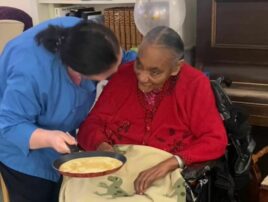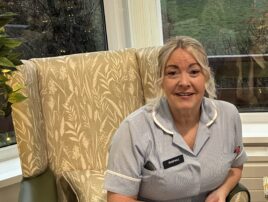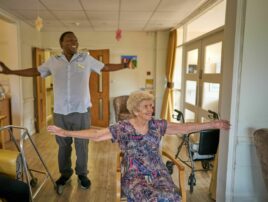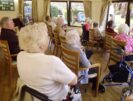Friday 7th November 2025
Care that truly cares
To gain a deeper understanding of The Way We Care, the approach to care at Pilgrims’ Friend Society, Helen Nathan joined a training session alongside staff members at Shottermill House, Haslemere
Donning a pair of goggles partially obscured by sticky tape, with socks on my hands and my arms pinned behind me with a stretchy band, I, alongside my fellow training participants, headed tentatively down the corridor at Shottermill House.
The purpose was to give us a sense of how the world might feel to an older person whose eyesight and fine motor skills are declining, something which is particularly prevalent in those living with dementia. We all agreed it was highly disorienting, affecting spatial awareness and balance. The thing I found most strange was not being able to see my own hands. Partway through, we were invited to sit down on a chair and get up again – no mean feat when your vision and movement are impaired.
This immersive exercise was one of a host of ways we were prompted to empathise with those living with us. Although not every person living in our care homes has dementia, a high proportion are affected at some level, and so this aspect of care was explored in great depth, in the context of relational care for everyone.
At Pilgrims’ Friend Society, we take a ‘whole home’ approach to care, with each staff member receiving training in The Way We Care, our charity’s bespoke approach to caring for people as individuals. We train all staff - from the office to the maintenance team - in this approach because it encompasses so much more than the basic tasks of physically providing personal care.
It's for that reason that I, as Communications and PR Manager, was at Shottermill House for training alongside carers, housekeepers, a Hummingbird, the administrator and the business manager, as well as colleagues from the Marketing and Communications Team. The session was led by Friederike Hamilton, our overall The Way We Care Lead. Eliza, the new Wellbeing and Dementia Lead, was also present as, going forwards, she will oversee the team at the home as they put the training into practice.

We began our day by watching two thought-provoking performance poems: ‘The Gift-Wrap & The Jewel’, where a 92-year-old woman movingly recites a poem about what it feels like to be older, and ‘What Do You See Now?’ exploring how people with dementia sometimes feel. Both films helped emphasise how people who are older and living with dementia are still people, just like everyone else, deserving of love and respect.

We also reflected on Psalm 92, a favourite passage at Pilgrims’ Friend Society, which reminds us that God still has a purpose for us in older age. As we read in verse 14, ‘They will still bear fruit in old age, they will stay fresh and green...’
We then moved to considering positive and negative care actions, with reference to a video clip featuring David Sheard, a leading voice in the field of dementia care. Using the example of making toast, Sheard highlights a spectrum of approaches ranging from ‘positive social’, where you join the person by having some toast yourself and bring the experience to life by evoking the senses and memory, through to a ‘negative restrictive’ approach where a person’s request is rebuffed with a curt ‘don’t be silly you’ve had three slices already’.
The group reflected on the importance of being sensitive to a person’s feelings, acknowledging that feelings matter most, and that behind the request there may be a need they are trying to communicate. Perhaps the person who has had toast already is feeling lonely and what they are really seeking is company and interaction.
Splitting into smaller groups, we then considered a range of responses to scenarios that could occur in a care setting. For example, saying to a person ‘Don’t wear those you will fall’ might on the face of it seem like an appropriate response to an unsuitable footwear choice, but it could make a person feel humiliated. Saying ‘Those don’t look very comfortable, shall we find some others?’ might be kinder. We explored how the best approach could be to ensure the person only has a suitable range of footwear to choose from in the first place, working with relatives as necessary.
Reflecting on our likes and dislikes served as a springboard to thinking about the importance of knowing the person you are caring for really well, not just the headlines but the details, too. For example, handing a small fluffy animal to someone when a petting farm comes to visit might not go down well if they have a lifelong fear of rats, even if they do like animals in general.
We ended the session by going through the GEMS, a way of thinking about the stages of dementia designed by Teepa Snow. The videos about the GEMs are online and are worth a watch for anyone seeking to understand the progression of dementia better, including how it affects a person in a multitude of ways, not just memory.

As someone who visits our care homes regularly, I came away with some useful strategies, such as the technique of rephrasing and saying ‘tell me more’ when someone says something that seems illogical such as ‘My mum will be coming to get be soon’, leading to a positive conversation where they find reassurance.
There were also some useful points to ponder regarding the tools you might use to support different people. A doll to hold can be comforting to someone with an instinct for and a past linked to nurturing babies, but taking it out of a cupboard can be confusing – babies don’t live in cupboards, after all.
I left the day with a renewed respect for those in our homes who care for our family members. To put others first so consistently day after day takes high levels of skill, resilience and dedication, working closely alongside colleagues. And it’s this whole-hearted, joined up approach that makes all the difference to those who may now struggle to communicate their own needs and desires, but who nonetheless still have so much to give.
More about The Way We Care...

The Way We Care
Our unique approach to ensuring that older people have all that they need to flourish in their later years

Janet and Sam's The Way We Care story
After a difficult time, life for Janet was transformed by our dedicated staff at Luff House, Walton-on-the-Naze, as they followed our The Way We Care approach which places the individual at the centre

The Way We Care - Friederike explains
Friederike Hamilton explains what makes this approach to care so special, including the vital role of Wellbeing & Dementia Leads in each of our homes

































